|
|
|
Sort Order |
|
|
|
Items / Page
|
|
|
|
|
|
|
| Srl | Item |
| 1 |
ID:
148062
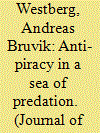

|
|
|
|
|
| Summary/Abstract |
How do anti-piracy forces engage with the coast of Somalia? Several studies have criticised the navies for being ineffective and stumbling in their fight against pirates and in their engagement with local communities. Somali sentiments are reportedly coloured by considerable scepticism towards the international naval effort, not least due to a feeling of double standards towards foreign trawlers seen plundering the country's resources. This study investigates the naval–coastal nexus along the Somali coast by drawing on field research off- and onshore. It finds that anti-piracy forces’ presence have had a considerable impact on the decline in piracy. Moreover, naval–coastal engagement and cooperation run deeper than is commonly perceived. While grievances against illegal fishing are widespread, examination of the fishing sector reveals a significant amount of predation committed by local stakeholders. Competition for fishing sector rents, particularly over distribution of licences, occurs on the local, regional and national levels. Bonds between some pirates, smugglers and officials threaten coastal community development and undermine their security. This study concludes that Somalia's maritime predatory trap can only be broken when former pirate villages are engaged as equal partners in the regional blue economy.
|
|
|
|
|
|
|
|
|
|
|
|
|
|
|
|
| 2 |
ID:
189003
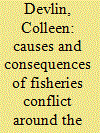

|
|
|
|
|
| Summary/Abstract |
Fisheries conflict is an underappreciated threat to the stability and health of communities. Declining fish populations, rising demand for seafood, and efforts to reduce illegal fishing are increasing the risk that conflict over fisheries resources will undermine stability and peace. Here, we investigate the frequency, causes, and consequences of fisheries conflict in six countries around the Horn of Africa and East Africa (Tanzania, Kenya, Somalia, Djibouti, Eritrea, and Yemen) between 1990 and 2017. Fisheries conflict events were cataloged from news reports, and events were characterized by the date, location, actors, consequences, and drivers of the conflict. We found the rate of fisheries conflict is gradually increasing in the region, with spikes in conflict driven by the arrival of foreign fishing boats or international naval vessels. Conflict was caused primarily by illegal fishing, foreign fishing, weak governance, limits on access to fishing grounds, and criminal activities including piracy. Two-thirds of all conflict events occurred in Kenyan and Somali waters, with areas of high conflict intensity in the Lake Victoria region, near the Somali coastline, and in the southern Red Sea. During this period, 684 fisheries conflict events in the region resulted in over 400 fatalities, nearly 500 injuries, and over 4,000 arrests.
|
|
|
|
|
|
|
|
|
|
|
|
|
|
|
|
| 3 |
ID:
167522
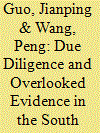

|
|
|
|
|
| Summary/Abstract |
In the South China Sea Arbitration, the Tribunal decided that China had not breached the due diligence obligation to protect and preserve the marine environment under Articles 192 and 194(5) of the United Nations Convention on the Law of the Sea concerning Chinese fishers fishing with explosives, but that China had breached the same obligation regarding Chinese fishers harvesting endangered species. This article looks at how the Tribunal interpreted and applied the due diligence obligation and argues, from a Chinese perspective, that there were facts overlooked by the Tribunal that China could have presented to counter the evidence of the Philippines, which might have been enough to affect the decision on destructive fishing had China participated in the Arbitration.
|
|
|
|
|
|
|
|
|
|
|
|
|
|
|
|
| 4 |
ID:
120227
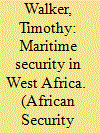

|
|
|
|
|
| Publication |
2013.
|
| Summary/Abstract |
This article will briefly examine the maritime security situation in 2013 in the Gulf of Guinea and the coast of West Africa, where a number of internationally integrative approaches for improving counter-piracy efforts are being developed. As the maritime domain is both vast and complex, the article focuses on two of the major problems causing the present situation of maritime insecurity - firstly, piracy and armed robbery at sea, and secondly, Illegal, Unreported and Unregulated (IUU) fishing. The progress in the provision of maritime security in regards to both problems is assessed. Finally, a number of concise recommendations for improving maritime security are highlighted.
|
|
|
|
|
|
|
|
|
|
|
|
|
|
|
|
| 5 |
ID:
190735
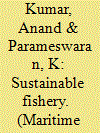

|
|
|
|
|
| Summary/Abstract |
The world ocean is a continuum that facilitates relatively free interchange among its parts and is of fundamental importance to studying environmental justice. Environmental justice sits within the larger ambit of social justice and equity. The article examines the effects of illegal, unreported, and unregulated (IUU) fishing within the Indian Ocean Region (IOR) on sustainability, and damage to the marine ecology, resulting in environmental and distributive injustice to the coastal communities. It also highlights the prevalence of IUU fishing on the high seas and in the exclusive economic zones (EEZ) of the coastal States vis-à-vis existing international fisheries laws. In addition, the article analyses the feasibility of managing the marine environment in the IOR through people’s participation, utilising the tenets of Commander’s Estimate of the Situation (CES), and suggests courses of action (CoAs) to achieve environmental justice. Further, it makes use of three case studies to assess the feasibility of people's participation in achieving sustainable fishing practices.
|
|
|
|
|
|
|
|
|
|
|
|
|
|
|
|
|
|
|
|
|